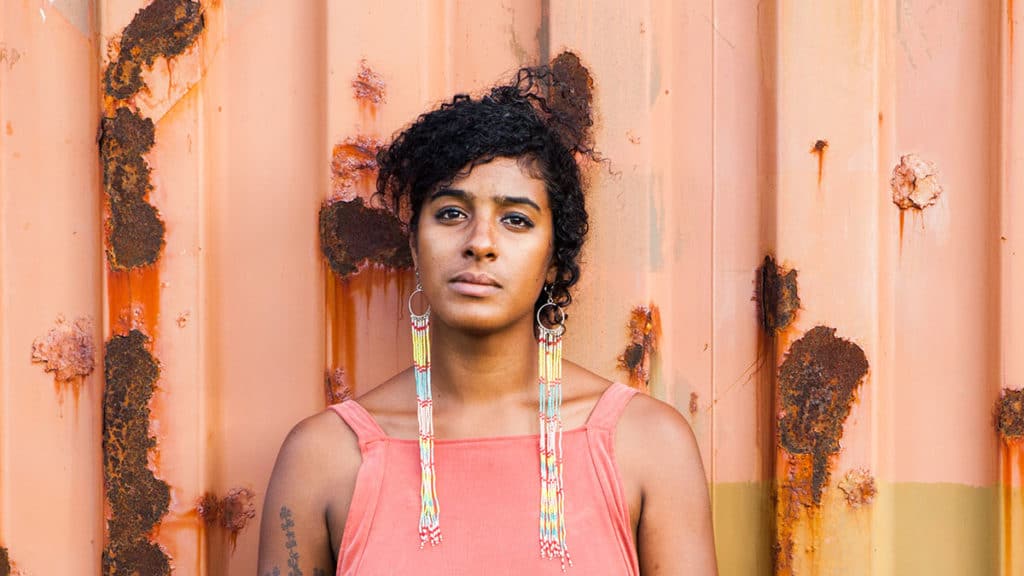Leyla McCalla is a classically-trained New Orleans Haitian Creole singer-songwriter who is one of the great American voices.
She is a bridge from the sweet Caribbean folk music of Haiti and New Orleans to to folk music of the United States. Yes folk music and even American country music have African Diaspora roots. You’d think country music would be the exception that proved the rule that most American popular culture originated in the African Diaspora, but there is no exception. The banjo is an African instrument. So in McCalla, you can see the branches and some of the roots. The music’s relationships are much clearer than if you just compared three different artists.
Leyla McCalla in New York City

Singer songwriter Leyla McCalla plays Alternative folk music of the African Diaspora from her fifth album “Sun Without the Heat,” including Afrobeat, Ethiopian, Brazilian Tropicalismo, and American folk and blues; in Joe’s Pub at the Public Theater in NoHo, Manhattan; on Friday, April 12, 2024 at 7pm (6pm doors). $38. publictheater.org 🇭🇹 🇺🇸 🇧🇷 🇪🇹
Previous Venues
These are some of the places where McCalla has played recently:
- Carnegie Hall
- Ginny’s Supper Club
- Harlem Stage
- Lincoln Center
- World Music Institute
Leyla McCalla
Leyla McCalla is a New York-born singer-songwriter with a Haitian Creole heritage who lives in New Orleans. A classically-trained musician, she played cello in the Grammy-winning string band The Carolina Chocolate Drops.
McCalla comes from a family of Haitian humanitarians. She spent some of her teenage years in Ghana, studied cello and chamber music at New York University, and then moved to New Orleans to play on the streets of the French Quarter.
She is a founding member of the Black female supergroup Our Native Daughters with Rhiannon Giddens, Allison Russel, and Amythyst Kiah.
It’s hard to place her music. She sounds like American folk. She sounds like New Orleans. She sounds like Haiti. Her songs are filled with the poetry and humor of the Caribbean and the U.S. American celebration of the underdog, or maybe that’s the voice of her family of humanitarians.
“It’s okay to be overwhelmed, but don’t let yourself be overcome.”
Leyla McCalla
McCalla is full to the brim with the blues and she can really swing. In her American Creole context, McCalla recalls the Cuban Trova protest music of Pepe Sánchez of Cuba, Ileana Cabra (Calle 13) of Puerto Rico , Violeta Parra of Chile, and Bob Dylan and Joan Baez of the United States. Today, women lead the march.
Watching her develop, you could see a girl becoming a woman, and a woman becoming a goddess. In the simplest of terms, Leyla McCalla is on her way to becoming one of the great American voices.
Follow McCalla at leylamccalla.com, on Instagram @leylacello
Leyla McCalla Albums
Her album titles speak volumes all by themselves.
Breaking the Thermometer (To Hide the Fever)
“Breaking the Thermometer” (2022, ANTI-)
The title reminded us of the “Alternate Facts” (pure nonsense) that have become so popular in American and global political discourse.
The album is actually about Radio Haiti, an independent radio station that broadcast in Kreyòl and spoke loudly against the corruption and violence of political elites, until it was silenced. The project grew out of a Duke University theater commission.
The music is striking. She sounds American folk, she sounds Haitian Creole, she sounds rock, she sounds classical, she sounds afrobeats. Throughout Leyla delivers layers of Caribbean calm that is very Haitian and Lesser Antilles Creole. You hear lots of Caribbean rhythms, but they are slightly different from what you hear in Cuba, Puerto Rico or Colombia. It’s more Dahomey and less Yoruba. She sings some serious lullabies.
One of the surprising things is how American she sounds. You hear traditional American Folk music because much of it comes from the African Diaspora. And Haiti is one of the taproots of African American culture. In 1810, half the population of New Orleans was Haitian Diaspora. This is who we are.
Neil Spencer of “The Guardian” newspaper called the record, “An ambitious accomplished piece of work.”
The Capitalist Blues
The title of “The Capitalist Blues” (2019, Jazz Village/PIAS) speaks to capitalist exploitation.
We used to think complaining about capitalism was nonsense, but we don’t think that any more. American capitalism is based on the Caribbean plantation model that the French developed in Saint-Domingue which became Haiti. French love paperwork. They wrote the book on how to run a plantation. The English took the book to Barbados and then brought it to what became the United States.
It’s the model for American big business, an exploitation model like was done to Haiti and Haitians. According to “The Guardian” in June 2022, the wage gap between US CEOs and workers is now 670-to-1. These are the capitalist blues.
A Day for the Hunter, A Day for the Prey
“A Day for the Hunter, A Day for the Prey” (2016, Jazz Village/harmonia mundi).
McCalla understands how the hunter and the prey are inextricably bound together. You are what you eat. And who is the hunter and who is the prey is not always how it looks to be.
One of the things that’s happening today is that the underprivileged communities of the past are becoming the leaders of global Pop culture. It’s our day, a day for the prey.
Vari-Colored Songs: A Tribute to Langston Hughes
“Vari-Colored Songs: A Tribute to Langston Hughes” (2014, Music Makers).
We have traveled the world, but never seen a Black person or a White person. But we have seen many varied beautiful shades of brown, the natural color of humanity.
We started coverage of Leyla on our own, but Harlem Stage sponsored her in 2022.
